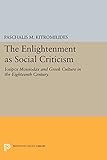The Enlightenment as Social Criticism : Iosipos Moisiodax and Greek Culture in the Eighteenth Century / Paschalis M. Kitromilides.
Material type: TextSeries: Princeton Modern Greek Studies ; 29Publisher: Princeton, NJ : Princeton University Press, [2014]Copyright date: ©1992Edition: Course BookDescription: 1 online resource (234 p.)Content type:
TextSeries: Princeton Modern Greek Studies ; 29Publisher: Princeton, NJ : Princeton University Press, [2014]Copyright date: ©1992Edition: Course BookDescription: 1 online resource (234 p.)Content type: - 9780691602844
- 9781400862726
- BIOGRAPHY & -- AUTOBIOGRAPHY -- Social Scientists & -- Psychologists
- Educators -- Greece -- Biography
- HISTORY -- Modern -- 18th century
- POLITICAL SCIENCE -- Public Policy -- Cultural Policy
- SOCIAL SCIENCE -- Anthropology -- Cultural
- SOCIAL SCIENCE -- Popular Culture
- HISTORY / Modern / 18th Century
- 306/.09495
- online - DeGruyter
- Issued also in print.
| Item type | Current library | Call number | URL | Status | Notes | Barcode | |
|---|---|---|---|---|---|---|---|
 eBook
eBook
|
Biblioteca "Angelicum" Pont. Univ. S.Tommaso d'Aquino Nuvola online | online - DeGruyter (Browse shelf(Opens below)) | Online access | Not for loan (Accesso limitato) | Accesso per gli utenti autorizzati / Access for authorized users | (dgr)9781400862726 |
Frontmatter -- CONTENTS -- LIST OF ILLUSTRATIONS -- PREFACE -- ACKNOWLEDGMENTS -- NOTE ON TRANSLITERATION -- INTRODUCTION. BIOGRAPHY AND THE SOCIAL SCIENCES -- PART ONE: ITINERARIES OF A LIFE -- PART TWO: THE COHERENCE OF A VISION -- EPILOGUE -- BIBLIOGRAPHY -- INDEX
restricted access online access with authorization star
http://purl.org/coar/access_right/c_16ec
In eighteenth-century Greek culture, Iosipos Moisiodax (c.1725-1800) was a controversial figure, whose daring pronouncements in favor of cultural change embroiled him in ideological conflicts and made him a target of persecution. The first intellectual in Southeastern Europe to voice the ideas of the Enlightenment in public and without qualification, he advocated the use of vernacular Greek in education and aspired to see the backward and intellectually conservative Balkan societies remodeled along European lines. In the first modern book-length treatment of this passionate reformer, Paschalis Kitromilides skillfully retraces Moisiodax's career and contrasts the Greek Enlightenment with the Western Enlightenment as a whole, enriching our understanding of each tradition in the process. Moisiodax's efforts failed tragically in his own lifetime, but his vision of the Enlightenment was an impressive project of intellectual reconstruction that had a considerable effect after his death, both in the promotion of modern scientific ideas and in the enunciation of republican politics in Southeastern Europe. The methodology of literary history has traditionally dominated inquiries about his life and about the Greek Enlightenment in general, but here both man and movement are examined from an interdisciplinary perspective. Drawing on a broad range of sources and combining insights from the social sciences, cultural history, and political theory, this work reveals Moisiodax as a figure of major significance in the ideological tradition of Southeastern Europe.Originally published in 1992.The Princeton Legacy Library uses the latest print-on-demand technology to again make available previously out-of-print books from the distinguished backlist of Princeton University Press. These editions preserve the original texts of these important books while presenting them in durable paperback and hardcover editions. The goal of the Princeton Legacy Library is to vastly increase access to the rich scholarly heritage found in the thousands of books published by Princeton University Press since its founding in 1905.
Issued also in print.
Mode of access: Internet via World Wide Web.
In English.
Description based on online resource; title from PDF title page (publisher's Web site, viewed 30. Aug 2021)


